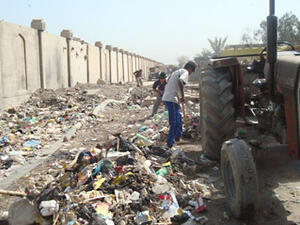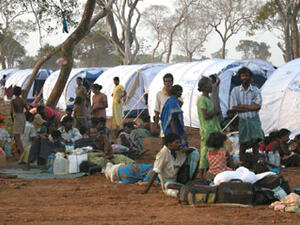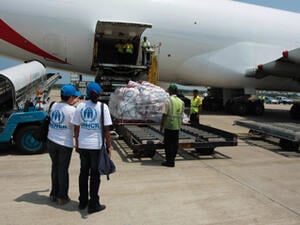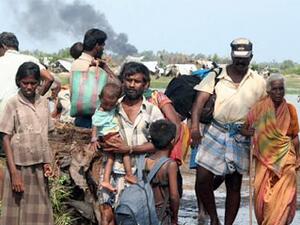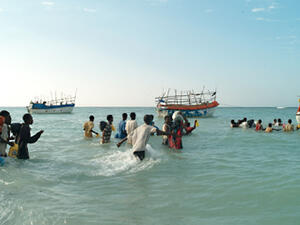UNHCR official visits Balkans, honours victims of Srebrenica massacre
UNHCR official visits Balkans, honours victims of Srebrenica massacre

Assistant High Commissioner Kamel Morjane (third from right) viewing exhibits at the Potocari Memorial Centre in Srebrenica.
SREBRENICA, Bosnia and Herzegovina, March 17 (UNHCR) - Assistant High Commissioner for Refugees Kamel Morjane, now on mission in the Balkans, has called for those responsible for the Srebrenica massacre to be brought to justice.
Morjane made the remarks on Tuesday as he visited a memorial for the thousands of Bosniak men and boys who are believed to have been murdered by the Bosnian Serb Army after it captured the enclave in July 1995. The killings represented the worst atrocity of the 1992-1995 Bosnia war, becoming the symbol of the brutality of the Balkan conflicts of the 1990s.
The Assistant High Commissioner urged the local authorities to help determine the fate of Srebrenica's men, most of whom are officially listed as missing. He spoke during a wreath-laying ceremony at the village of Potocari outside Srebrenica, where men and boys were separated from their loved ones and taken away, never to be seen again.
Bosnia and Herzegovina was the second leg in Morjane's week-long tour of the Balkans which also included Croatia as well as the Union of Serbia and Montenegro.
During meeting with Bosnian officials in Sarajevo on Monday, Morjane hailed the significant achievements and progress made in the return process in Bosnia and Herzegovina since the signing of the Dayton Peace Agreement in December 1995. Nearly one million people have returned to their homes since then, including hundreds of thousands who have gone back to live among their one-time adversaries.

Visiting the Kravica Collective Centre in Srebrenica.
In Serbia and Montenegro, which hosts the Balkans' and Europe's largest uprooted population, the Assistant High Commissioner's discussions with local officials were expected to focus on the prospects for an estimated 220,000 internally displaced people who fled Kosovo in the summer of 1999 and some 280,000 ethnic Serb refugees who found refuge in Serbia during the wars in Croatia and Bosnia.
On Friday, Morjane was expected to travel to Kosovo, where he was scheduled to meet with top UN officials and Kosovo's ethnic Albanian leaders. UNHCR officials said the trip was still on track despite violent clashes on Wednesday between ethnic Albanians and Serbs. The violence near the northern Kosovo town of Mitrovica left several people dead.
Unlike in Bosnia, which has seen a significantly number of people go back to their homes since the war ended, in Kosovo only a small fraction of those who fled in 1999 have returned to their homes despite intense efforts to reconcile Kosovo's ethnic communities.



